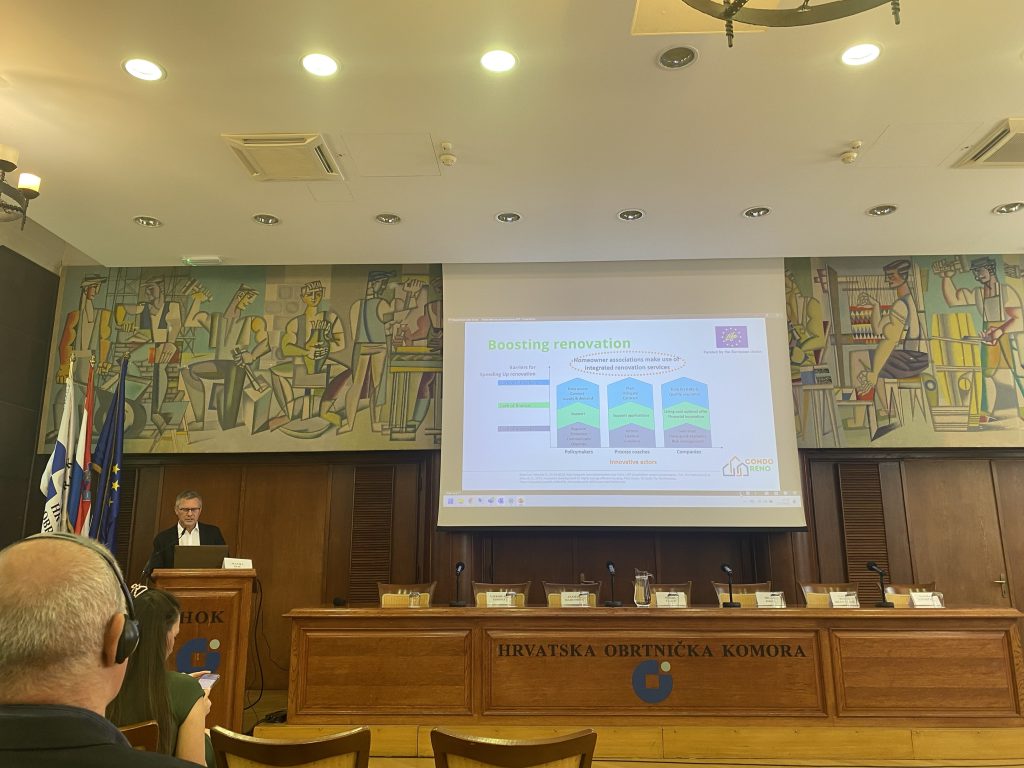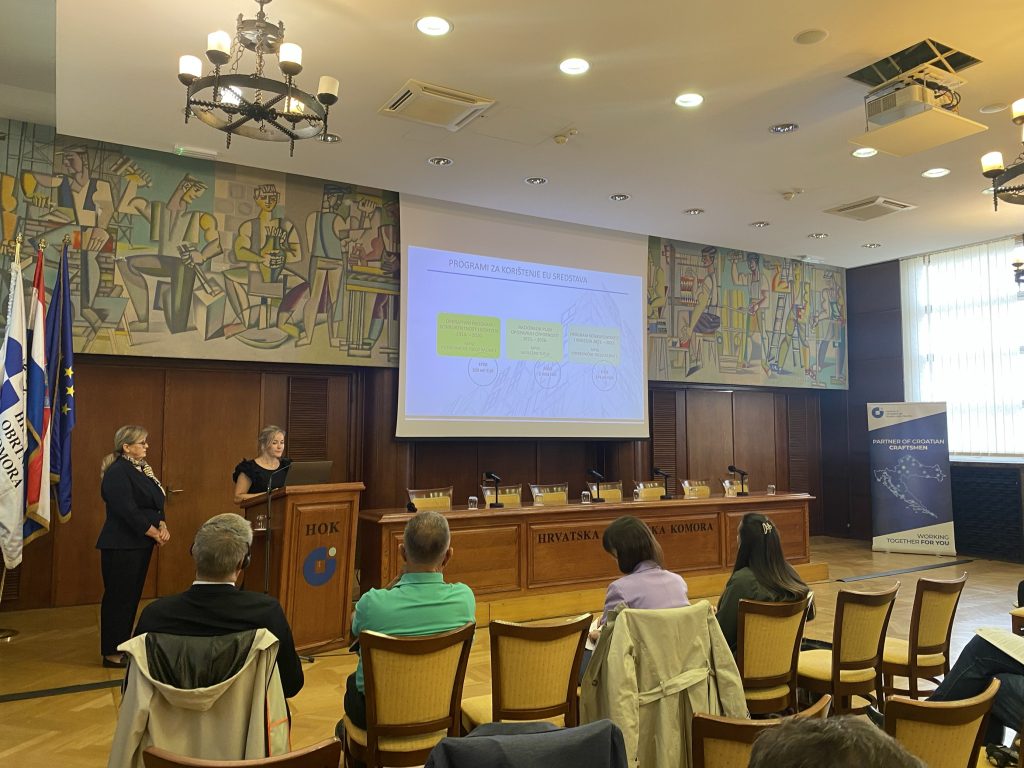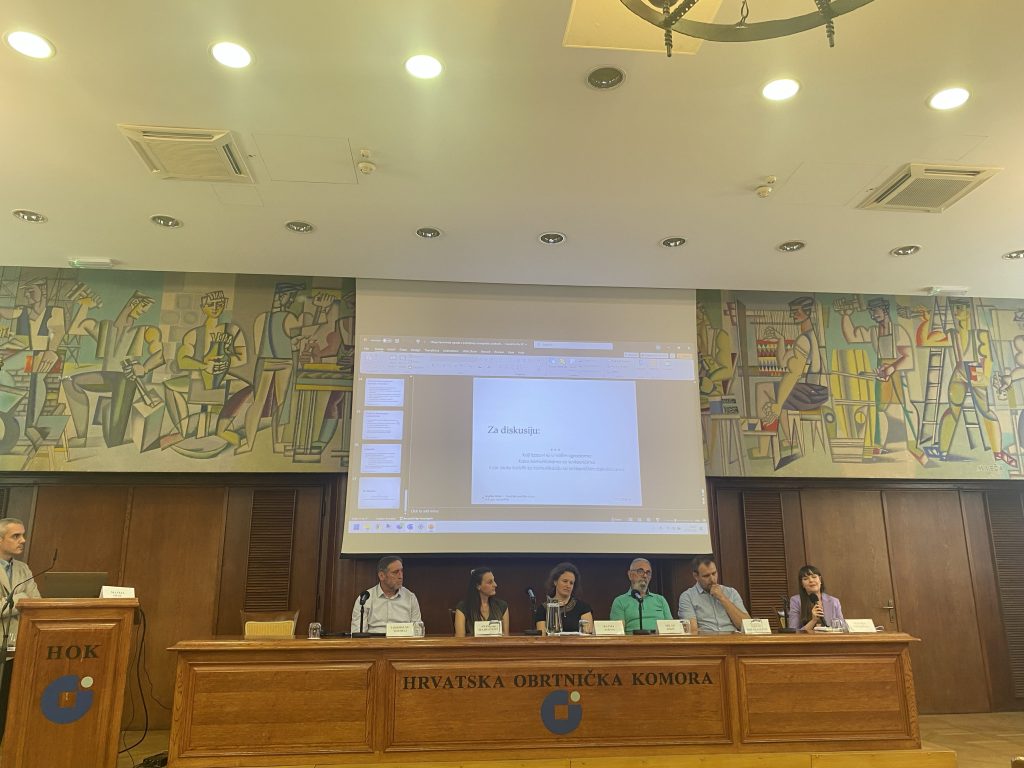
Energy Efficiency: EBC and HOK host CondoReno workshop in Zagreb on boosting condominium renovations
May 28, 2025
On 27 May, EBC in collaboration with the Croatian Chamber of Trades and Crafts (HOK) hosted a workshop in Zagreb to promote integrated energy renovations in Croatia’s residential building sector. Organized within the framework of the LIFE project CondoReno, the event, titled ”Boosting Residential Building Renovations: European Examples and the Croatian Market”, gathered Croatian energy efficiency stakeholders, EU representatives, and renovation experts to tackle the slow pace of energy renovation in the Croatian residential building stock.
The workshop was moderated by Matija Duić, Advisor at the Croatian Chamber of Trades and Crafts (HOK), who guided the programme and facilitated discussion among the various speakers and participants.
National and European voices on building renovation
Opening remarks from the Ministry of Physical Planning, Construction and State Assets were delivered by Diana Horvat, the Head of Sector for Energy Efficiency in the Buildings, and Mia Jurinović, Senior Expert Advisor at Sector for Call Preparation and Implementation of EU Projects. They outlined the Ministry’s current focus areas in the field of building renovation, including regulatory alignment with EU objectives and the need for more structured support mechanisms at national level. Their remarks emphasized the importance of long-term planning and stakeholder coordination to improve the uptake and quality of energy renovation across the residential sector.
Thibault Roy of the European Commission’s DG Energy presented the recast Energy Performance of Buildings Directive (EPBD), emphasizing the pivotal role of One-Stop Shops (OSS) in providing comprehensive renovation services. He outlined upcoming EU obligations and opportunities, particularly the 2030 and 2050 targets for energy efficiency and emissions reduction.
Best practices in practice
Dr. Bojan Milovanović of the University of Zagreb presented an analysis of Croatia’s residential building stock, noting that most multi-family dwellings remain well below energy efficiency standards. He highlighted the energy-saving potential within this segment but pointed to structural and legal barriers that frequently impede renovation efforts. His presentation stressed the importance of providing technical support to enable co-owners to navigate the renovation process more effectively.
Slavica Robić from the North-West Croatia Regional Energy and Climate Agency (REGEA) shared perspectives on citizen-led renovation initiatives. Her presentation focused on the role of community energy projects and emphasized how local engagement and participation can support the broader energy transition, particularly in addressing energy poverty and promoting inclusive approaches.
Anamari Majdandžić, representing the crOss renoHome project and DOOR, described practical experiences from One-Stop-Shops operating in Zagreb and Križevci. She explained how these centres provide centralized support to co-owners, offering technical, financial, and legal guidance to help them navigate the complexities of renovation projects.
Erwin Mlecnik of TU Delft introduced the CondoReno model, which combines renovation scenarios, stakeholder engagement, and long-term planning to overcome the fragmented nature of condominium ownership. His presentation focused on European case studies and emphasized the importance of appointing renovation “process coaches” to support homeowner associations throughout the journey.
To conclude this part of the event, Andrija Mihić, an experienced building manager, contributed insights on operational realities in managing renovation projects, including effective communication with co-owners and navigating fragmented governance structures.
Expert panel
The panel discussion brought together a diverse group of experts to reflect on the practical and structural barriers to accelerating residential renovations in Croatia. Speakers included Assoc. Prof. Dr. Bojan Milovanović (Faculty of Civil Engineering, University of Zagreb), Milan Jokić (Association of Tenants and Co-owners), Nataša Vistrička (International Union of Property Owners, UIPI), Anamari Majdandžić (DOOR), Katija Jaram (Ministry of Physical Planning, Construction and State Assets), and Vjekoslav Terihaj (representing contractors and SMEs).
One of the central themes of the discussion was the urgent need to build up the skills base required to implement high-quality renovation work. Several participants pointed to the growing gap between policy ambition and the available skilled workforce in Croatia. Concerns were raised about the capacity of SMEs and craftspeople to deliver complex renovations, with calls for targeted support to enhance vocational training and attract new professionals into the sector.
The issue of property and ownership structures in Croatia was also highlighted as a significant barrier. Fragmented co-ownership, legal uncertainties, and slow decision-making within homeowner associations continue to delay or prevent much-needed renovation projects. There was agreement on the importance of procedural reforms and clearer legal pathways to enable collective decision-making and streamline renovation planning in multi-owner buildings.
Drawing on experiences from the CondoReno model and local OSS initiatives, the panellists also discussed the potential of integrated renovation services to support owners through the technical and administrative complexity of renovation projects. Questions were raised about how to build trust among hesitant or disengaged co-owners and ensure they have access to clear, impartial advice.
Looking ahead
This workshop in Zagreb is part of EBC’s ongoing work under the LIFE CondoReno project to support the replication of integrated home renovation services across Europe. It confirmed the central role of One-Stop Shops in helping property owners navigate complex renovation processes and improve building performance. EBC will continue promoting practical solutions and knowledge exchange, with workshops planned in other EU countries.
Disclaimer:

This project has received funding from the European Union’s Program for Environment and Climate Action (LIFE) MGA — Multi & Mono, under grant agreement No. 101076316. Views and opinions expressed on the event are however those of the author(s) only and do not necessarily reflect those of the European Union or CINEA. Neither the European Union nor the granting authority can be held responsible for them.


